Ethnic Nationalities (252 found)
Five-Point Agreement with the United Wa State Army
The full text of the agreement between the Union Peace Working Committee and the United Wa State Army (UWSA) in Burmese language.
• •Eight-Point Agreement Between the Union Peace-Making Committee and the Karenni National Progressive Party
The Union Peace-Making Committee and the Karenni National Progressive Party (KNPP) held negotiations on 19 and 20 June in Loikaw with Vice-Chairman of the committee Union Minister U Aung Min and Vice-Chairman of KNPP Khu U Yal in attendance. The two parties released this eight-point agreement today […]
• •A Tentative Peace in Myanmar’s Kachin Conflict
On 30 May 2013, the Kachin Independence Organisation (KIO) signed a tentative peace agreement with the Myanmar government – the last of the eleven major ethnic armed groups to do so since 2011. This represents a major opportunity to secure lasting peace in Kachin State, and in the country as a whole. Yet, there will be significant challenges in doing so. Key issues still need to be discussed and agreed, including the repositioning of troops from both sides to reduce the chance of clashes, a monitoring mechanism, and a meaningful political dialogue. Major steps need to be taken to develop an equitable peace economy, and the exploitation of Kachin’s significant natural resources, if not appropriately regulated, could compound inequalities and trigger renewed conflict. Much remains to be done to avoid a repeat of the failures of the previous ceasefire process […]
• • •Access Denied: Land Rights and Ethnic Conflict in Burma
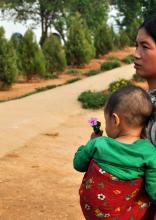 The reform process in Burma/Myanmar1 by the quasi-civilian government of President Thein Sein has raised hopes that a long overdue solution can be found to more than 60 years of devastating civil war. Burma’s ethnic minority groups have long felt marginalized and discriminated against, resulting in a large number of ethnic armed opposition groups fighting the central government – dominated by the ethnic Burman majority – for ethnic rights and autonomy. The fighting has taken place mostly in Burma’s borderlands where ethnic minorities are most concentrated […]
The reform process in Burma/Myanmar1 by the quasi-civilian government of President Thein Sein has raised hopes that a long overdue solution can be found to more than 60 years of devastating civil war. Burma’s ethnic minority groups have long felt marginalized and discriminated against, resulting in a large number of ethnic armed opposition groups fighting the central government – dominated by the ethnic Burman majority – for ethnic rights and autonomy. The fighting has taken place mostly in Burma’s borderlands where ethnic minorities are most concentrated […]
Where Are the Women? Negotiations for Peace in Burma
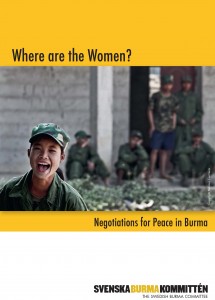 Women in Burma are effectively excluded from participating in the negotiations for peace. Less than a handful of women have been part of the official talks held between the State and the armed groups, and none of the 12 preliminary ceasefire agreements reviewed for this report includes any references to gender or women. The expertise of local women’s groups in peacemaking and trust building efforts has gone unnoticed, and concerns raised by women are being sidelined. The interest by the dominant funders of the Burmese peace building initiatives, the international community, in advocating for the increased participation of women or for the mainstreaming of gender responsiveness has been, at best, inadequate. This is a worrisome development which requires action from both international and local actors as the continued exclusion of women risks undermining the legitimacy of the entire process […]
Women in Burma are effectively excluded from participating in the negotiations for peace. Less than a handful of women have been part of the official talks held between the State and the armed groups, and none of the 12 preliminary ceasefire agreements reviewed for this report includes any references to gender or women. The expertise of local women’s groups in peacemaking and trust building efforts has gone unnoticed, and concerns raised by women are being sidelined. The interest by the dominant funders of the Burmese peace building initiatives, the international community, in advocating for the increased participation of women or for the mainstreaming of gender responsiveness has been, at best, inadequate. This is a worrisome development which requires action from both international and local actors as the continued exclusion of women risks undermining the legitimacy of the entire process […]
The Kachin Crisis: Peace Must Prevail
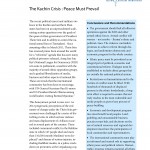 The recent political unrest and military violence in the Kachin and northern Shan states has been on an unprecedented scale, raising serious questions over the goals of the quasi-civilian government of President Thein Sein and its ability to control the national armed forces (Tatmadaw). Since assuming office in March 2011, Thein Sein has received praise from around the world for a “reformist” agenda that has seen many political prisoners released, Aung San Suu Kyi’s National League for Democracy (NLD) win seats to parliament, ceasefires with the majority of armed ethnic opposition groups, and a gradual liberalisation of media, business and other aspects of national life. These are trends that the international community has been keen to encourage, with UN General-Secretary Ban Ki-moon and US President Barack Obama among world leaders visiting Burma/Myanmar […]
The recent political unrest and military violence in the Kachin and northern Shan states has been on an unprecedented scale, raising serious questions over the goals of the quasi-civilian government of President Thein Sein and its ability to control the national armed forces (Tatmadaw). Since assuming office in March 2011, Thein Sein has received praise from around the world for a “reformist” agenda that has seen many political prisoners released, Aung San Suu Kyi’s National League for Democracy (NLD) win seats to parliament, ceasefires with the majority of armed ethnic opposition groups, and a gradual liberalisation of media, business and other aspects of national life. These are trends that the international community has been keen to encourage, with UN General-Secretary Ban Ki-moon and US President Barack Obama among world leaders visiting Burma/Myanmar […]
State Terror in the Kachin Hills
In late 2012, the Burma Army intensified military operations against strongholds of the Kachin Independence Army (KIA). This culminated in a massive offensive on the KIA headquarters at Laiza on the China-Burma border starting in mid-December […]
• • •Developing Disparity: Regional Investment in Burma’s Borderlands
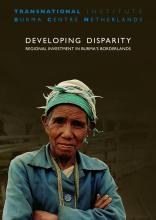 Unless foreign direct investment in Burma’s war-torn borderlands is refocused towards people-centered development, it is likely to deepen disparity between the region’s most neglected peoples and Burma’s new military, business and political elite and exacerbate a decades-long civil war.
Unless foreign direct investment in Burma’s war-torn borderlands is refocused towards people-centered development, it is likely to deepen disparity between the region’s most neglected peoples and Burma’s new military, business and political elite and exacerbate a decades-long civil war.
Burma has entered a pivotal stage in its political and economic development. The advent of a new quasi-civilian government has raised the prospect of fundamental reforms […]
Deciphering Myanmar’s Peace Process: A Reference Guide
The new nominally civilian government is making serious efforts to achieve peace in Myanmar after more than 60 years of civil war. Peace is critical for ending human suffering and achieving stability; a precondition for overcoming poverty, ensuring long term development and protecting
• • •Excluded: Burma’s Ethnic Nationalities on the Margins of Development and Democracy
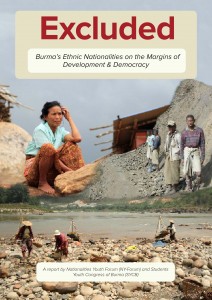 This report presents documented evidence that ethnic nationalities directly affected by development projects in Burma are systematically denied their right to free, prior, and informed consent (FPIC). While development related abuse has been well documented, no report has shed light on the staggering scale of the widespread denial of participation rights in Burma […]
This report presents documented evidence that ethnic nationalities directly affected by development projects in Burma are systematically denied their right to free, prior, and informed consent (FPIC). While development related abuse has been well documented, no report has shed light on the staggering scale of the widespread denial of participation rights in Burma […]

 All posts
All posts